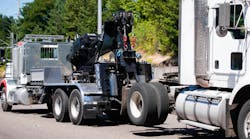If you were a truck manufacturer or one of their major component suppliers, 2007 would be looming large right now. As a truck buyer, you're obviously concerned about the added initial and ongoing operating costs of the new 2007 low-emissions diesels, but one way or another you'll pass on those costs.
The stakes are much higher for manufacturers, however. Their ability to remain viable long-term businesses is threatened by “pre-buy,” a sharp increase in truck sales just before the January 2007 changeover to low-emissions diesels, followed by an equally sharp decrease in sales.
Building trucks is an enormous manufacturing operation that relies on a complex supply chain of tightly interlocked suppliers. The process can't be quickly adjusted like a thermostat to follow a market that suddenly heats up or cools down.
Just how costly was brought home by the pre-buy we witnessed in 2002. Worried about the unknown reliability of new diesel emissions technology, fleets loaded up on as much new equipment as they could before those engines hit the market in October 2002. And then truck sales fell off the table. The result for truck suppliers was more consolidation, painful restructuring and some tense times as they attempted to bring production in line with demand.
But 2007 is not 2002, and there are some good reasons to believe that any pre-buy will be moderate, if not minor.
For one, a court order shortened development of the technology for 2002 by more than a year, creating major questions for truck users about both the reliability and durability of the new engines. This next change is far more orderly, with plenty of time for fleets to get acquainted with the new engines before they have to buy them in significant quantities.
The economy also argues against another pre-buy. The 2003-03 recession gave fleets the option of foregoing new equipment purchases since there wasn't much freight to move anyway. Now, the strong freight market has everyone scrambling to replace aging fleets with new trucks. Production capacity will be almost completely consumed building replacements, and there will be few “extra” trucks available for fleets to build a pre-2007 cushion.
But you buy trucks, not build them, so why should you care about another pre-buy? Because you have to have a reliable supply of trucks with reasonable delivery dates and prices when you need them. Such a supply rests on truck makers being able to minimize demand cycles and maximize production processes.
There is one way to ensure an orderly transition that would also offer significant benefits to truck buyers and the general public. There is a move afoot to offer financial incentives, most likely through tax credits of some type, to fleets that buy trucks with the new engines. Such an incentive plan could prevent a pre-buy while also help fleets offset the additional costs of the new engines. And the public benefits since it would encourage faster adoption of far cleaner trucks.
There's a cliche to describe this kind of solution, but I won't use it. Instead, let's just hope that our legislators recognize a good idea when they hear it.
E-mail: [email protected]
Web site: fleetowner.com


